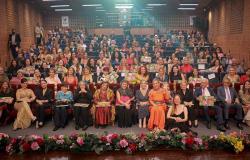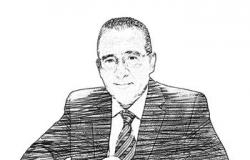One of the great themes of literature is the family: as a refuge or a field of war, as a claustrophobic experience or allegory of the world, as a synonym for goodness or a violent metaphor. Fathers, mothers, brothers, children and grandparents have served as inspiration for authors such as Franz Kafka, Albert Cohen or Gilmer Mesa to write books that are like reckonings or declarations of love. About this, the Polish writer and Nobel Prize winner in Literature Czeslaw Milosz said: “when a writer is born into a family, that family is finished.”
Nothing is true It is a book of autofiction, but it transcends the conventions of this genre that has saturated book shelves and media pages in recent years. He distances himself from sublimations and settling scores, avoids solemnity at all costs and, in the face of misfortune, plants laughter and humor. as a flag.
In this way, Raimo laughs at herself and her love life, at the melancholic aggressiveness of her mother, at her father who built walls and more walls at home, from his brother Christian Raimo, who is also a writer, of his grandmother’s tits, of impossible loves, of lovers, of abortions, of perverted old men on public transport and of literature itself. Nothing and no one is saved.
This author, recently nominated for the International Booker Prize, She is one of the guests at the Bogotá International Book Fair (FILBo). In this conversation, before her visit to Bogotá, Verónica Raimo talks about humor, tenderness, autofiction and those who influenced her particular sense of humor.
Cover of the book in Spanish ‘Nothing is true’
Photo:Asteroid Books
I think it has to do with the fact that I spent my childhood and a good part of my adolescence feeling ashamed. This is an emotion that I have a great connection with, a way of feeling and experiencing life that is natural to me. And writing from her opened up the possibility of writing about my family, not as a way of revenge, but as a way of having control. Because, as Ursula K. Le Guin’s epigraph at the beginning of the novel says, I truly believe that shame is a powerful social instrument. If you hurt someone or someone hurt you, I think it’s okay to feel a little embarrassed on both sides.
The book talks about topics such as death, rivalry, family secrets, abortion, but it never falls into the trap of solemnity. Quite the opposite: the narrator, faced with this danger, puts humor first. What was it like to build this narrative record?
This is a trait of my personality that has helped me survive in the world, that others may find irritating or annoying. Sometimes people worry so much about such trivial things that I have the natural need to reduce the emphasis, the rhetoric, the melodramas. I always try to deconstruct and demolish emphases. However, this is something that runs from my family. When something tragic happened at home, we looked for a way to find the humorous twist. That’s why I think humor and tragedy are strongly interconnected. When someone believes every day that they are going to die, the tragedy of the situation becomes hilarious. At least to me, the idea that someone obsesses daily about his own death seems comical. So when writing I try to give the worst traumas a touch of irony.
Completely agree. This is how the best kind of irony works, for example, in the films of Charles Chaplin. In them we laugh at terrible things: violence, poverty, authoritarianism. Laughter comes at things that in other contexts would make us ashamed.
The publishing market is oversaturated with nonfiction novels. However, in Nothing is true It stands out from all the others because it does something that is not very common in this formula: talk about shame and humor. What is it like to construct autofiction that moves away from the cliché of seriousness?
I was very tired of the autofiction formula. Especially those written by other women, because it seems that you must write about some trauma, about your body or your suffering. Or worse yet: we writers are required to know what we want, when, where and how. It seems to be frowned upon for a woman to be lost in the world or for her to still have doubts about what she wants. Writing has become, in that sense, a field of ‘work hard, be successful and overcome all your traumas’. I wanted to deconstruct that and remove layer after layer of all that forced solemnity.
What is humor for you?
Humor is the opportunity to see things from another angle, understand the world from another perspective. Also using that register when writing allows you to look at everything from a certain distance, to better understand the world. However, this does not mean that seriousness and irony are incompatible or contrary subjects. For me the best comedians are the ones who say funny things in the most serious ways. So I think humor is saying the funniest things in the most serious way and expressing the serious as if it were something funny.
People project themselves into what they read, especially if they are connected in some way to the author.
Very important names such as the American comedian David Sedaris and the writer Philip Roth were references for this book. They have a very particular way of seeing the world and taking a word to give it irony. However, I also believe that there are authors who influenced me and who are not necessarily considered funny. For example, I think of Albert Camus and his sense of the absurd. Or in other arts such as cinema, I feel very attracted to the work of Monty Python.
It is said that writers always write about what they know, what they have experienced and who they know (friends, family). Is the relationship the other way around too? That is to say, when a writer’s friends or family read him or her, are they always going to look for themselves in what they read?
Friends and family will always have a degree of narcissism when reading the books you write. The strange thing is that many times they don’t care so much if you write about them, but are more offended if you don’t. They take it to mean that you don’t love them enough to use them in your work. And if you write fiction, as is the case with this book, they are still going to look for excuses to see themselves. It’s a situation where you can never win. For example, a roommate I lived with for three months, not even a friend of hers, was convinced that a character was based on her. That? No! That’s not how writing works. People project themselves into what they read, especially if they are connected in some way to the author.
I think that behind the family what is hidden is a discourse about the hierarchy, the powers and the violence behind these dynamics. Many times we confuse love, whatever it may be, with some form of violence and vice versa. And violence can be very subtle things like having two parents who think they always know what is best for you, to the point of suppressing and repressing spontaneity in your life. It’s something they do while tenderly telling you ‘this is good for you, this is what you need’. So finally what I wanted to do when talking about the concept of family was to deconstruct the concept of love.
Reading articles and reviews for this interview I noticed that they have often overlooked a transversal theme to the novel: tenderness. Nothing is true It has many flashes of tenderness, which go unnoticed by critics. Why do you think this happens?
This question is interesting, because Colombia is where they have really focused on the tenderness of the novel and the characters. Perhaps it has to do with a certain cultural closeness between Colombians and Italians, a way of showing emotions that in other latitudes they cannot understand. This is not something that worries critics in northern Europe or the East. And I think it has to do with a narrative device: if I didn’t do it, my mother, for example, would have been portrayed as a one-dimensional and terrible character, which of course she is not. I think that’s where the tender dimension of my narration comes into play.
For the time
Journalist and writer.






